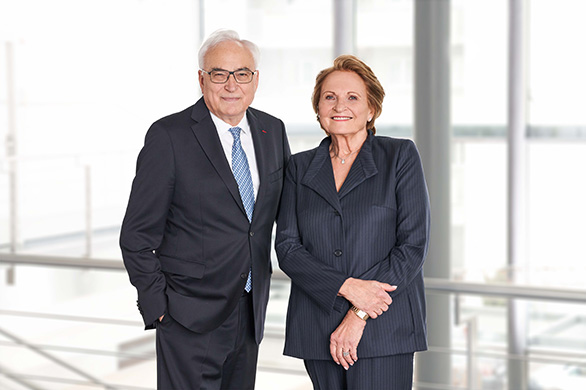
Mrs Liebherr, you and your brother usually review the previous financial year. Today, for the first time, the four of you are here to answer our questions. How did this come about and what signal are you hoping to convey?
Isolde Liebherr: The Liebherr Group has been led by the second and third generation of our family for many years. Some of our children, nieces and nephews have been members of the administrative board of Liebherr-International AG since 2013. All fundamental issues regarding the management of the business are decided on jointly. This is why we agreed to also officially review the company’s performance together. This year, Jan and Stéfanie represent the third generation, so that’s why there are four of us.
The Liebherr Group is led by eight members of the Liebherr family. How do you arrive at decisions?
Willi Liebherr: Communication and an intensive exchange of information underpin all our decisions. We continually talk to each other, hold discussions, consolidate our knowledge and then reach decisions together. This way we can ensure that we are all acting as equals.
Isolde Liebherr: For us as the older generation, this means that we have every confidence in the decisions the younger family board members are making. Everything has been working out really well since management responsibilities were handed over to the third generation a few years ago. It was important to us to initiate the generation succession process as early as possible and to avoid a sudden change.
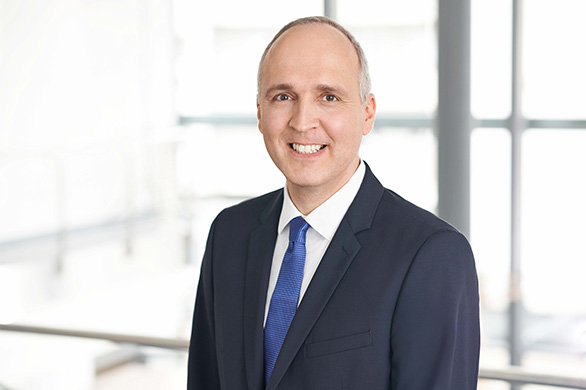
Shall we now take a look at the previous financial year? In 2019, the Group achieved turnovers of € 11,750 million, breaking the record for the third year in a row. How do you view this performance?
Jan Liebherr: Turnover increased by 11.4% last year. Diversification has been one of the key factors behind our dynamic growth. It shows that our versatile product portfolio has put us in a strong position because it ensures that we do not rely on the performance of individual business divisions. What’s more, it shows that our customers are satisfied with our products and services. After all, our core objective is to ensure our solutions provide genuine added value. This kind of growth would never have been possible without our customers. We are particularly pleased that turnover has increased across all divisions.
How have the individual regions performed?
Stéfanie Wohlfarth: We experienced significant growth in Western Europe and North America. Sales growth was particularly strong in established industrialised nations, such as Germany, the USA and Canada.
Jan Liebherr: We are also seeing growth in the large emerging economies. For instance, turnover rose in Brazil, India, China and Russia. Brazil’s economy is continuing to recover. The refrigerator and freezer factory we opened in India in 2018 is proving to be another driver of growth. China’s national economy has now become more stable and mature. As a high-quality manufacturer, this presents us with more opportunities than ever before, which is why we are continuing to invest there. For example, last year we opened an assembly plant for our gear technology and automation systems in Yongchuan. And of course, Russia has traditionally been a very important market for us.
What are your views on the operating result?
Isolde Liebherr: We are pleased on the whole. However, we anticipate that the large investments we have made over recent years will be more clearly reflected in our future results.
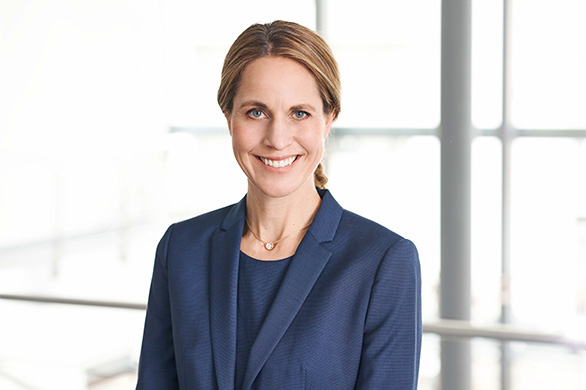
What were your highlights and key milestones during 2019?
Jan Liebherr: It has to be Bauma, the world's leading trade show for construction machinery. I am still receiving a lot of positive feedback about Liebherr’s presence at the show and the product innovations we showcased there. For example, our generation 8 crawler excavator, our ETM series electric truck mixer and the LB 16 unplugged, the world's first battery-powered rotary drilling rig. I think our products left a lasting impression on our visitors.
A key milestone was definitely the record revenues and volumes achieved by the Earthmoving division in 2019. This is a major step forward for us in terms of both earthmoving equipment and material handling technology.
Stéfanie Wohlfarth: Seventy years ago, my grandfather Hans Liebherr filed a patent application for the TK 10, the first mobile tower crane. We marked the anniversary of this event shortly after Bauma 2019. It felt very emotional at Bauma to see all the things that have been developed in the seventy years following his first invention. Our tower crane division achieved an important milestone with our new fibre rope which is an excellent alternative to conventional steel rope. It weighs less, so it can lift heavier loads and it is also more durable. Taking over the operations of our crane distributor in Australia and New Zealand was also a major step forward for this division.
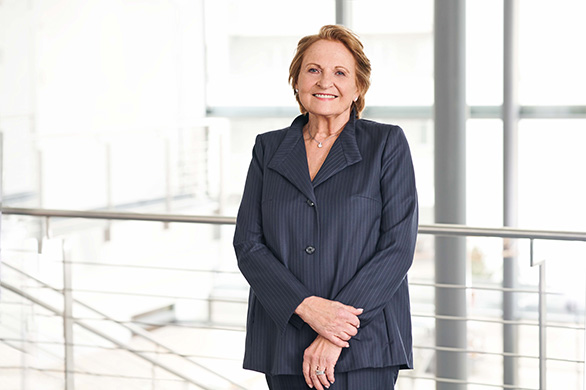
Isolde Liebherr: Bauma is naturally a standout event for all of us. However, the commissioning of the TCC 78000 heavy-duty gantry crane in the Port of Rostock was also a special highlight for me. This 164-metre crane has become a real landmark for the city. The Port Equipment business has been performing very well overall in recent years. We are market leaders for mobile harbour cranes and there is high demand for our container cranes produced in our factory in Killarney.
Our factory in Nenzing can also look back on a successful year of business. Sales of hydraulic rope excavators and deep foundation machines were particularly pleasing. The specialist expertise we have developed in the attachment tools business is also being very well received in the marketplace.
We are also delighted that our hotel in Ireland, ‘The Europe’, had another record year. It was a great honour for us when ‘The Europe’ was included in the Legend Collection, a group of around one hundred exclusive hotels. It was generally a good year for all of our six hotels.
Willi Liebherr: I was also very inspired during my visit to the Paris Air Show, which is the world’s largest aerospace exhibition. We received a number of awards in Paris, including some from Airbus and Embraer. Our systems for the Boeing 777X were on show during the event.
We also showcased the Celsineo cooling system for semi-trailers which we have recently developed with our partner Krone. This is a great innovation for temperature-controlled road freight transport.
Our latest innovations from our Mining division were another highlight for me. We have invested a great deal in the electrification of our products, with the R 9200 E electric mining excavator and the T 236 diesel-electric mining truck being notable examples. These machines are driving forward our efforts to achieve the ‘zero emissions mine’.
I would also like to mention mobile cranes as we have also set a new sales record in this division. However, I believe our latest innovations are even more noteworthy, such as the prototype of the new LTM 1650-8.1 heavy-duty crane or our other solutions, which enhance work safety. This includes our numerous assistance systems and a remote control system that makes it possible to control a crawler crane from outside the vehicle.
Seventy years ago, Hans Liebherr filed a patent application for the TK 10, the first mobile tower crane.
Jan Liebherr: Our Components division has performed very well and third-party business has also grown. This shows that the investments we have made over the past few years are starting to pay off. We have continually developed our diesel engines and injection systems in recent years and are now offering new models. In addition, we are working on developing even lighter components. The development of a cylinder partially made from CFRP has laid solid foundations for our research. We are now field testing the first prototypes and are very proud of our efforts.
Stéfanie Wohlfarth: We have also achieved good results in our refrigeration and freezing segment. We exceeded the one billion euro mark for gross sales for the first time. Another important milestone was the opening of our customer centre in Ochsenhausen and the consolidation of our sales activities in Germany with the establishment of Liebherr-Hausgeräte Vertriebs- und Service GmbH. For Gear Technology both the EMO Hannover, the leading industry trade show, as well as integrating gear measurement technology into our portfolio were certainly real highlights. The division will be able to offer comprehensive processing solutions for gearing in the future.
What were the challenges last year?
Stéfanie Wohlfarth: A group of companies offering such a diverse product portfolio faces a multitude of challenges. We had to engage with the issue of materials procurement across all divisions. This wasn’t easy, especially in view of our rate of growth. We discussed the matter at length with our suppliers, had to streamline deliveries more tightly and coordinate operations even more efficiently.
Willi Liebherr: Issues such as Brexit and the trade war between China and the USA received a great deal of media coverage during the year and have caused uncertainty. However, we have still managed to grow by nearly 12% in spite of this. This proves to me that we are generally able to withstand these kinds of events relatively well.
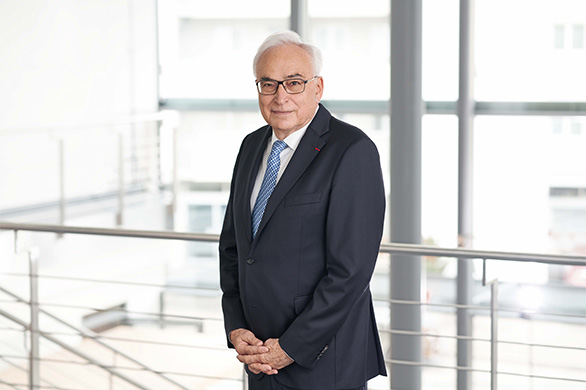
Many companies are faced with a current skills shortage. How is Liebherr feeling the effects of this?
Isolde Liebherr: We have seen that it is becoming increasingly difficult for us to find suitably qualified staff in certain specialist areas, such as IT. This is obviously a problem for growing companies which are focusing more and more on digital technologies. On the whole, however, it would be true to say that most of our plants don’t have many problems, particularly if we have been based there for a long time. Liebherr continues to be regarded as an attractive employer and we are very proud that our staff remain with us for many years.
Willi Liebherr: I think that many of our employees spend their entire working lives with us because we offer them high levels of autonomy. We believe that proactive and entrepreneurial thinking are extremely important, so we ensure the conditions are right for this. It’s also a very good way to increase motivation. Having said this, we also actively look out for new talent, for example at universities. We naturally understand that we need to develop awareness and the appeal of our employer branding, especially in locations where we have not been active for very long.
A subject which is particularly important for the younger generation is corporate responsibility. Mrs Wohlfarth and Mr Liebherr, how would you describe the Group’s approach to this subject?
Stéfanie Wohlfarth: We feel that we contribute in a narrow sense by providing employment and support for over 48,000 people and their families as well as serving as a partner for countless suppliers and customers. We are very aware of our responsibilities in this regard: It is our duty to always be the best of the best and to drive the business forward with our innovations. We must also develop our business in a stable and steady way. In a broader sense, we don’t just play a part in employment, we also help to solve social issues.
Our products help people to be mobile whether they are travelling by road, train, sea or air.
Jan Liebherr: That’s right. Our products help people to be mobile whether they are travelling by road, train, sea or air. Our machines create buildings and infrastructure, help to supply people with raw materials and energy, and assist with the storage of food products and medication. Our technologies facilitate cargo handling at ports and are used in agriculture and forestry. Our products are part of all our daily lives. They don’t just provide direct benefits for our customers but for the general public as a whole.
Which challenges do you think are going to arise over the long term for the Group?
Jan Liebherr: We need to ensure that we continue to be a driver of innovation. The Liebherr name is synonymous with cutting-edge technology and this should remain the case in our ever rapidly changing world. Our technologies are extremely diversified. We have an incredible amount of expertise and we are able to establish trends. It’s important that we maintain this position. Our challenge will be to coordinate our activities across the different areas centrally and to leverage greater synergies than before.
Stéfanie Wohlfarth: With all this in mind, it’s important that we continue to focus on our customers. We need to continually ask ourselves who our customers are, what they need and which markets they are operating in. In turn, we need to always have the right answers to these questions. This is a huge challenge in terms of the many industries and countries we operate in. The pace of change and volatility which characterise today’s markets may tempt us to make quick, ad-hoc decisions. However, it’s important to maintain a broad perspective and to proceed with a steady hand. We aim to continue managing the business in a sustainable and balanced way and to support steady growth. We don’t believe in growth at any cost.
Finally, please could you provide us with your outlook for the current financial year?
Willi Liebherr: Before the occurrence of the corona virus, we assumed stable turnover for the 2020 financial year. In the meantime, we have to expect a decline in turnover due to the pandemic. We are able to rely on our key strengths at this time, which include our financial autonomy, decentralised corporate structure and broad product portfolio that is structured according to country and market. The Liebherr Group is well positioned to overcome the challenges we will face during and after the coronavirus pandemic.




